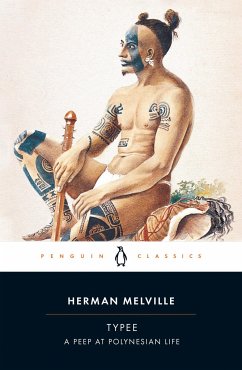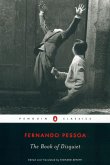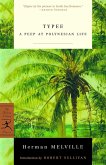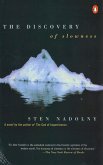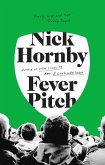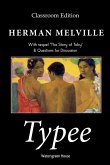- Broschiertes Buch
- Merkliste
- Auf die Merkliste
- Bewerten Bewerten
- Teilen
- Produkt teilen
- Produkterinnerung
- Produkterinnerung
At one time the most popular of Melville's works, Typee was known as a travelogue that idealized and romanticized a mysterious South Sea island for readers in the ruthless, industrial, "civilized" world of the nineteenth century. But Melville's story of Tommo, the Yankee sailor who enters the flawed Pacific paradise of Nuku Hiva, is also a fast-moving adventure tale, an autobiographical account of the author's own Polynesian stay, an examination of the nature of good and evil, and a frank exploration of sensuality and exotic ritual. This edition of Typee, which reproduces the definitive text…mehr
Andere Kunden interessierten sich auch für
![The Book of Disquiet The Book of Disquiet]() Fernando PessoaThe Book of Disquiet16,99 €
Fernando PessoaThe Book of Disquiet16,99 €![Casanovas Heimfahrt: Desillusionierung eines Verführers: Eine erotische Novelle des Autors von Traumnovelle, Reigen und Fräulein Else Casanovas Heimfahrt: Desillusionierung eines Verführers: Eine erotische Novelle des Autors von Traumnovelle, Reigen und Fräulein Else]() Arthur SchnitzlerCasanovas Heimfahrt: Desillusionierung eines Verführers: Eine erotische Novelle des Autors von Traumnovelle, Reigen und Fräulein Else5,99 €
Arthur SchnitzlerCasanovas Heimfahrt: Desillusionierung eines Verführers: Eine erotische Novelle des Autors von Traumnovelle, Reigen und Fräulein Else5,99 €![Typee Typee]() Herman MelvilleTypee12,99 €
Herman MelvilleTypee12,99 €![Typee Typee]() Herman MelvilleTypee19,99 €
Herman MelvilleTypee19,99 €![The Discovery of Slowness The Discovery of Slowness]() Sten NadolnyThe Discovery of Slowness30,99 €
Sten NadolnyThe Discovery of Slowness30,99 €![Fever Pitch Fever Pitch]() Nick HornbyFever Pitch14,99 €
Nick HornbyFever Pitch14,99 €![Typee Typee]() Herman MelvilleTypee17,99 €
Herman MelvilleTypee17,99 €-
-
-
At one time the most popular of Melville's works, Typee was known as a travelogue that idealized and romanticized a mysterious South Sea island for readers in the ruthless, industrial, "civilized" world of the nineteenth century. But Melville's story of Tommo, the Yankee sailor who enters the flawed Pacific paradise of Nuku Hiva, is also a fast-moving adventure tale, an autobiographical account of the author's own Polynesian stay, an examination of the nature of good and evil, and a frank exploration of sensuality and exotic ritual. This edition of Typee, which reproduces the definitive text and the complete, never-before-published manuscript reading text, includes invaluable explanatory commentary by John Bryant.
Typee is a fast-moving adventure tale, an autobiographical account of the author's Polynesian stay, an examination of the nature of good and evil, and a frank exploration of sensuality and exotic ritual. For more than seventy years, Penguin has been the leading publisher of classic literature in the English-speaking world. With more than 1,700 titles, Penguin Classics represents a global bookshelf of the best works throughout history and across genres and disciplines. Readers trust the series to provide authoritative texts enhanced by introductions and notes by distinguished scholars and contemporary authors, as well as up-to-date translations by award-winning translators.
Typee is a fast-moving adventure tale, an autobiographical account of the author's Polynesian stay, an examination of the nature of good and evil, and a frank exploration of sensuality and exotic ritual. For more than seventy years, Penguin has been the leading publisher of classic literature in the English-speaking world. With more than 1,700 titles, Penguin Classics represents a global bookshelf of the best works throughout history and across genres and disciplines. Readers trust the series to provide authoritative texts enhanced by introductions and notes by distinguished scholars and contemporary authors, as well as up-to-date translations by award-winning translators.
Produktdetails
- Produktdetails
- Verlag: Penguin Publishing Group
- Seitenzahl: 368
- Erscheinungstermin: 1. Januar 1996
- Englisch
- Abmessung: 198mm x 131mm x 20mm
- Gewicht: 248g
- ISBN-13: 9780140434880
- ISBN-10: 0140434887
- Artikelnr.: 20973961
- Herstellerkennzeichnung
- Libri GmbH
- Europaallee 1
- 36244 Bad Hersfeld
- gpsr@libri.de
- Verlag: Penguin Publishing Group
- Seitenzahl: 368
- Erscheinungstermin: 1. Januar 1996
- Englisch
- Abmessung: 198mm x 131mm x 20mm
- Gewicht: 248g
- ISBN-13: 9780140434880
- ISBN-10: 0140434887
- Artikelnr.: 20973961
- Herstellerkennzeichnung
- Libri GmbH
- Europaallee 1
- 36244 Bad Hersfeld
- gpsr@libri.de
Herman Melville; Introduction and Explanatory Commentary by John Bryant

TypeeIntroduction by John Bryant
Works Cited and Suggested for Further Reading
A Note on the Text
TYPEE
Preface
Chapter 1
The Sea
Longing for Shore
A Land-sick Ship
Destination of the Voyagers
The Marquesas
Adventures of a Missionary's Wife Among the Savages
Characteristic Anecdote of the Queen of Nukuheva
Chapter 2
Passage from the Cruising Ground to the Marquesas
Sleepy times aboard Ship
South Sea Scenery
Land ho!
The French Squadron discovered at Anchor in the Bay of Nukuheva
Strange Pilot
Escort of Canoes
A Flotilla of Cocoa-nuts
Swimming Visitors
The Dolly boarded by them
State of affairs that ensue
Chapter 3
Some Account of the late operations of the French at the Marquesas
Prudent Conduct of the Admiral
Sensation produced by the Arrival of the Strangers
The first Horse seen by the Islanders
Reflections
Miserable Subterfuge of the French
Digression concerning Tahiti
Seizure of the Island by the Admiral
Spirited Conduct of an English Lady
Chapter 4
State of Affairs aboard the Ship
Contents of her Larder
Length of South Seamen's Voyages
Account of a Flying Whaleman
Determination to Leave the Vessel
The Bay of Nukuheva
The Typees
Invasion of their Valley by Porter
Reflections
Glen of Tior
Interview between the old King and the French Admiral
Chapter 5
Thoughts previous to attempting an Escape
Toby, a Fellow Sailor, agrees to share the Adventure
Last Night aboard the Ship
Chapter 6
A Specimen of Nautical Oratory
Criticisms of the Sailors
The Starboard Watch are given a Holiday
The Escape to the Mountains
Chapter 7
The other side of the Mountain
Disappointment
Inventory of Articles brought from the Ship
Division of the Stock of Bread
Appearance of the Interior of the Island
A Discovery
A Ravine and Waterfalls
A sleepless Night
Further Discoveries
My Illness
A Marquesan Landscape
Chapter 8
The Important Question, Typee or Happar?
A Wild-Goose Chace
My Suffering
Disheartening Situation
A Night in a Ravine
Morning Meal
Happy Idea of Toby
Journey towards the Valley
Chapter 9
Perilous Passage of the Ravine
Descent into the Valley
Chapter 10
The Head of the Valley
Cautions Advance
A Path
Fruit
Discovery of Two of the Natives
Their singular Conduct
Approach towards the inhabited parts of the Vale
Sensation produced by our Appearance
Reception at the House of one of the Natives
Chapter 11
Midnight Reflections
Morning Visitors
A Warrior in Costume
A Savage Aesculapius
Practice of the Healing Art
Body Servant
A Dwelling-house of the Valley described
Portraits of its Inmates
Chapter 12
Officiousness of Kory-Kory
His Devotion
A Bath in the Stream
Want of Refinement of the Typee Damsels
Stroll with Mehvi
A Typee Highway
The Taboo Groves
The Hoolah-Hoolah Ground
The Ti
Timeworn Savages
Hospitality of Mehevi
Midnight Misgivings
Adventure in the Dark
Distinguished Honors paid to the Visitors
Strange Procession and Return to the House of Marheyo
Chapter 13
Attempt to procure Relief from Nukuheva
Perilous Adventure of Toby in the Happar Mountain
Eloquence of Kory-Kory
Chapter 14
A great Event happens in the Valley
The Island Telegraph
Something befalls Toby
Fayaway displays a tender Heart
Melancholy Reflections
Mysterious Conduct of the Islanders
Devotion of Kory-Kory
A rural Couch
A Luxury
Kory-Kory strikes a Light à la Typee
Chapter 15
Kindness of Marheyo and the rest of the Islanders
A full Description of the Bread-fruit Tree
Different Modes of preparing the Fruit
Chapter 16
Melancholy condition
Occurrence at the Ti
Anecdote of Marheyo
Shaving the Head of a Warrior
Chapter 17
Improvement in Health and Spirits
Felicity of the Typees
Their enjoyment compared with those of more enlightened Communities
Comparative Wickedness of civilized and unenlightened People
A Skirmish in the Mountain with the Warriors of Happar
Chapter 18
Swimming in company with the Girls of the Valley
A Canoe
Effects of the Taboo
A pleasure Excursion on the Pond
Beautiful freak of Fayaway
Mantua-making
A Stranger arrives in the Valley
His mysterious conduct
Native Oratory
The Interview
Its Results
Departure of the Stranger
Chapter 19
Reflections after Marnoo's Departure
Battle of the Pop-guns
Strange conceit of Marheyo
Process of making Tappa
Chapter 20
History of a day as usually spent in the Typee Valley
Dances of the Marquesan Girls
Chapter 21
The Spring of Arva Wai
Remarkable Monumental Remains
Some ideas with regard to the History of the Pi-Pis found in the Valley
Chapter 22
Preparations for a Grand Festival in the Valley
Strange doings in the Taboo Groves
Monument of Calabashes
Gala costume of the Typee damsels
Departure for the Festival
Chapter 23
The Feast of Calabashes
Chapter 24
Ideas suggested by the Feast of Calabashes
Inaccuracy of certain published Accounts of the Islands
A Reason
Neglected State of Heathenism in the Valley
Effigy of a dead Warrior
A singular Superstition
The Priest Kolory and the God Moa Artua
Amazing Religious Observance
A dilapidated Shrine
Kory-Kory and the Idol
An Inference
Chapter 25
General Information gathered at the Festival
Personal Beauty of the Typees
Their Superiority over the Inhabitants of the other Islands
Diversity of Complexion
A Vegetable Cosmetic and Ointment
Testimony of Voyagers to the uncommon Beauty of the Marquesans
Few Evidences of Intercourse with Civilized Beings
Dilapidated Musket
Primitive Simplicity of Government
Regal Dignity of Mehevi
Chapter 26
King Mehevi
Allusion to his Hawiian Majesty
Conduct of Marheyo and Mehevi in certain delicate matters
Peculiar system of Marriage
Number of Population
Uniformity
Embalming
Places of Sepulture
Funeral obsequies at Nukuheva
Number of Inhabitants at Typee
Location of the Dwellings
Happiness enjoyed in the Valley
A Warning
Some ideas with regard to the Civilization of the Islands
Reference to the Present state of the Hawiians
Story of a Missionary's Wife
Fashionable Equipages at Oahu
Reflections
Chapter 27
The Social Condition and General Character of the Typees
Chapter 28
Fishing Parties
Mode of distributing the Fish
Midnight Banquet
Timekeeping Tapers
Unceremonious style of eating the Fish
Chapter 29
Natural History of the Valley
Golden Lizards
Tameness of the Birds
Mosquitos
Flies
Dogs
A solitary Cat
The Climate
The Cocoa-nut Tree
Singular modes of climbing it
An agile young Chief
Fearlessness of the Children
Too-Too and the Cocoa-nut Tree
The Birds of the Valley
Chapter 30
A Professor of the Fine Arts
His Persecutions
Something about Tattooing and Tabooing
Two Anecdotes in illustration of the latter
A few thoughts on the Typee Dialect
Chapter 31
Strange custom of the Islanders
Their Chanting, and the peculiarity of their Voice
Rapture of the King at first hearing a Song
A new Dignity conferred on the Author
Musical Instruments in the Valley
Admiration of the Savages at Beholding a Pugilistic Performance
Swimming Infant
Beautiful Tresses of the Girls
Ointment for the Hair
Chapter 32
Apprehensions of Evil
Frightful Discovery
Some remarks on Cannibalism
Second Battle with the Happars
Savage Spectacle
Mysterious Feast
Subsequent Disclosures
Chapter 33
The Stranger again arrives in the Valley
Singular Interview with him
Attempt to Escape
Failure
Melancholy Situation
Sympathy of Marheyo
Chapter 34
The Escape
Appendix: Provisional cession to Lord George Paulet of the Sandwich Islands
Sequel: The Story of Toby
Appendixes: List of Textual Expurgations; List of Textual Emendations
The Typee Manuscript: A Reading Text
Explanatory Notes
Works Cited and Suggested for Further Reading
A Note on the Text
TYPEE
Preface
Chapter 1
The Sea
Longing for Shore
A Land-sick Ship
Destination of the Voyagers
The Marquesas
Adventures of a Missionary's Wife Among the Savages
Characteristic Anecdote of the Queen of Nukuheva
Chapter 2
Passage from the Cruising Ground to the Marquesas
Sleepy times aboard Ship
South Sea Scenery
Land ho!
The French Squadron discovered at Anchor in the Bay of Nukuheva
Strange Pilot
Escort of Canoes
A Flotilla of Cocoa-nuts
Swimming Visitors
The Dolly boarded by them
State of affairs that ensue
Chapter 3
Some Account of the late operations of the French at the Marquesas
Prudent Conduct of the Admiral
Sensation produced by the Arrival of the Strangers
The first Horse seen by the Islanders
Reflections
Miserable Subterfuge of the French
Digression concerning Tahiti
Seizure of the Island by the Admiral
Spirited Conduct of an English Lady
Chapter 4
State of Affairs aboard the Ship
Contents of her Larder
Length of South Seamen's Voyages
Account of a Flying Whaleman
Determination to Leave the Vessel
The Bay of Nukuheva
The Typees
Invasion of their Valley by Porter
Reflections
Glen of Tior
Interview between the old King and the French Admiral
Chapter 5
Thoughts previous to attempting an Escape
Toby, a Fellow Sailor, agrees to share the Adventure
Last Night aboard the Ship
Chapter 6
A Specimen of Nautical Oratory
Criticisms of the Sailors
The Starboard Watch are given a Holiday
The Escape to the Mountains
Chapter 7
The other side of the Mountain
Disappointment
Inventory of Articles brought from the Ship
Division of the Stock of Bread
Appearance of the Interior of the Island
A Discovery
A Ravine and Waterfalls
A sleepless Night
Further Discoveries
My Illness
A Marquesan Landscape
Chapter 8
The Important Question, Typee or Happar?
A Wild-Goose Chace
My Suffering
Disheartening Situation
A Night in a Ravine
Morning Meal
Happy Idea of Toby
Journey towards the Valley
Chapter 9
Perilous Passage of the Ravine
Descent into the Valley
Chapter 10
The Head of the Valley
Cautions Advance
A Path
Fruit
Discovery of Two of the Natives
Their singular Conduct
Approach towards the inhabited parts of the Vale
Sensation produced by our Appearance
Reception at the House of one of the Natives
Chapter 11
Midnight Reflections
Morning Visitors
A Warrior in Costume
A Savage Aesculapius
Practice of the Healing Art
Body Servant
A Dwelling-house of the Valley described
Portraits of its Inmates
Chapter 12
Officiousness of Kory-Kory
His Devotion
A Bath in the Stream
Want of Refinement of the Typee Damsels
Stroll with Mehvi
A Typee Highway
The Taboo Groves
The Hoolah-Hoolah Ground
The Ti
Timeworn Savages
Hospitality of Mehevi
Midnight Misgivings
Adventure in the Dark
Distinguished Honors paid to the Visitors
Strange Procession and Return to the House of Marheyo
Chapter 13
Attempt to procure Relief from Nukuheva
Perilous Adventure of Toby in the Happar Mountain
Eloquence of Kory-Kory
Chapter 14
A great Event happens in the Valley
The Island Telegraph
Something befalls Toby
Fayaway displays a tender Heart
Melancholy Reflections
Mysterious Conduct of the Islanders
Devotion of Kory-Kory
A rural Couch
A Luxury
Kory-Kory strikes a Light à la Typee
Chapter 15
Kindness of Marheyo and the rest of the Islanders
A full Description of the Bread-fruit Tree
Different Modes of preparing the Fruit
Chapter 16
Melancholy condition
Occurrence at the Ti
Anecdote of Marheyo
Shaving the Head of a Warrior
Chapter 17
Improvement in Health and Spirits
Felicity of the Typees
Their enjoyment compared with those of more enlightened Communities
Comparative Wickedness of civilized and unenlightened People
A Skirmish in the Mountain with the Warriors of Happar
Chapter 18
Swimming in company with the Girls of the Valley
A Canoe
Effects of the Taboo
A pleasure Excursion on the Pond
Beautiful freak of Fayaway
Mantua-making
A Stranger arrives in the Valley
His mysterious conduct
Native Oratory
The Interview
Its Results
Departure of the Stranger
Chapter 19
Reflections after Marnoo's Departure
Battle of the Pop-guns
Strange conceit of Marheyo
Process of making Tappa
Chapter 20
History of a day as usually spent in the Typee Valley
Dances of the Marquesan Girls
Chapter 21
The Spring of Arva Wai
Remarkable Monumental Remains
Some ideas with regard to the History of the Pi-Pis found in the Valley
Chapter 22
Preparations for a Grand Festival in the Valley
Strange doings in the Taboo Groves
Monument of Calabashes
Gala costume of the Typee damsels
Departure for the Festival
Chapter 23
The Feast of Calabashes
Chapter 24
Ideas suggested by the Feast of Calabashes
Inaccuracy of certain published Accounts of the Islands
A Reason
Neglected State of Heathenism in the Valley
Effigy of a dead Warrior
A singular Superstition
The Priest Kolory and the God Moa Artua
Amazing Religious Observance
A dilapidated Shrine
Kory-Kory and the Idol
An Inference
Chapter 25
General Information gathered at the Festival
Personal Beauty of the Typees
Their Superiority over the Inhabitants of the other Islands
Diversity of Complexion
A Vegetable Cosmetic and Ointment
Testimony of Voyagers to the uncommon Beauty of the Marquesans
Few Evidences of Intercourse with Civilized Beings
Dilapidated Musket
Primitive Simplicity of Government
Regal Dignity of Mehevi
Chapter 26
King Mehevi
Allusion to his Hawiian Majesty
Conduct of Marheyo and Mehevi in certain delicate matters
Peculiar system of Marriage
Number of Population
Uniformity
Embalming
Places of Sepulture
Funeral obsequies at Nukuheva
Number of Inhabitants at Typee
Location of the Dwellings
Happiness enjoyed in the Valley
A Warning
Some ideas with regard to the Civilization of the Islands
Reference to the Present state of the Hawiians
Story of a Missionary's Wife
Fashionable Equipages at Oahu
Reflections
Chapter 27
The Social Condition and General Character of the Typees
Chapter 28
Fishing Parties
Mode of distributing the Fish
Midnight Banquet
Timekeeping Tapers
Unceremonious style of eating the Fish
Chapter 29
Natural History of the Valley
Golden Lizards
Tameness of the Birds
Mosquitos
Flies
Dogs
A solitary Cat
The Climate
The Cocoa-nut Tree
Singular modes of climbing it
An agile young Chief
Fearlessness of the Children
Too-Too and the Cocoa-nut Tree
The Birds of the Valley
Chapter 30
A Professor of the Fine Arts
His Persecutions
Something about Tattooing and Tabooing
Two Anecdotes in illustration of the latter
A few thoughts on the Typee Dialect
Chapter 31
Strange custom of the Islanders
Their Chanting, and the peculiarity of their Voice
Rapture of the King at first hearing a Song
A new Dignity conferred on the Author
Musical Instruments in the Valley
Admiration of the Savages at Beholding a Pugilistic Performance
Swimming Infant
Beautiful Tresses of the Girls
Ointment for the Hair
Chapter 32
Apprehensions of Evil
Frightful Discovery
Some remarks on Cannibalism
Second Battle with the Happars
Savage Spectacle
Mysterious Feast
Subsequent Disclosures
Chapter 33
The Stranger again arrives in the Valley
Singular Interview with him
Attempt to Escape
Failure
Melancholy Situation
Sympathy of Marheyo
Chapter 34
The Escape
Appendix: Provisional cession to Lord George Paulet of the Sandwich Islands
Sequel: The Story of Toby
Appendixes: List of Textual Expurgations; List of Textual Emendations
The Typee Manuscript: A Reading Text
Explanatory Notes
TypeeIntroduction by John Bryant
Works Cited and Suggested for Further Reading
A Note on the Text
TYPEE
Preface
Chapter 1
The Sea
Longing for Shore
A Land-sick Ship
Destination of the Voyagers
The Marquesas
Adventures of a Missionary's Wife Among the Savages
Characteristic Anecdote of the Queen of Nukuheva
Chapter 2
Passage from the Cruising Ground to the Marquesas
Sleepy times aboard Ship
South Sea Scenery
Land ho!
The French Squadron discovered at Anchor in the Bay of Nukuheva
Strange Pilot
Escort of Canoes
A Flotilla of Cocoa-nuts
Swimming Visitors
The Dolly boarded by them
State of affairs that ensue
Chapter 3
Some Account of the late operations of the French at the Marquesas
Prudent Conduct of the Admiral
Sensation produced by the Arrival of the Strangers
The first Horse seen by the Islanders
Reflections
Miserable Subterfuge of the French
Digression concerning Tahiti
Seizure of the Island by the Admiral
Spirited Conduct of an English Lady
Chapter 4
State of Affairs aboard the Ship
Contents of her Larder
Length of South Seamen's Voyages
Account of a Flying Whaleman
Determination to Leave the Vessel
The Bay of Nukuheva
The Typees
Invasion of their Valley by Porter
Reflections
Glen of Tior
Interview between the old King and the French Admiral
Chapter 5
Thoughts previous to attempting an Escape
Toby, a Fellow Sailor, agrees to share the Adventure
Last Night aboard the Ship
Chapter 6
A Specimen of Nautical Oratory
Criticisms of the Sailors
The Starboard Watch are given a Holiday
The Escape to the Mountains
Chapter 7
The other side of the Mountain
Disappointment
Inventory of Articles brought from the Ship
Division of the Stock of Bread
Appearance of the Interior of the Island
A Discovery
A Ravine and Waterfalls
A sleepless Night
Further Discoveries
My Illness
A Marquesan Landscape
Chapter 8
The Important Question, Typee or Happar?
A Wild-Goose Chace
My Suffering
Disheartening Situation
A Night in a Ravine
Morning Meal
Happy Idea of Toby
Journey towards the Valley
Chapter 9
Perilous Passage of the Ravine
Descent into the Valley
Chapter 10
The Head of the Valley
Cautions Advance
A Path
Fruit
Discovery of Two of the Natives
Their singular Conduct
Approach towards the inhabited parts of the Vale
Sensation produced by our Appearance
Reception at the House of one of the Natives
Chapter 11
Midnight Reflections
Morning Visitors
A Warrior in Costume
A Savage Aesculapius
Practice of the Healing Art
Body Servant
A Dwelling-house of the Valley described
Portraits of its Inmates
Chapter 12
Officiousness of Kory-Kory
His Devotion
A Bath in the Stream
Want of Refinement of the Typee Damsels
Stroll with Mehvi
A Typee Highway
The Taboo Groves
The Hoolah-Hoolah Ground
The Ti
Timeworn Savages
Hospitality of Mehevi
Midnight Misgivings
Adventure in the Dark
Distinguished Honors paid to the Visitors
Strange Procession and Return to the House of Marheyo
Chapter 13
Attempt to procure Relief from Nukuheva
Perilous Adventure of Toby in the Happar Mountain
Eloquence of Kory-Kory
Chapter 14
A great Event happens in the Valley
The Island Telegraph
Something befalls Toby
Fayaway displays a tender Heart
Melancholy Reflections
Mysterious Conduct of the Islanders
Devotion of Kory-Kory
A rural Couch
A Luxury
Kory-Kory strikes a Light à la Typee
Chapter 15
Kindness of Marheyo and the rest of the Islanders
A full Description of the Bread-fruit Tree
Different Modes of preparing the Fruit
Chapter 16
Melancholy condition
Occurrence at the Ti
Anecdote of Marheyo
Shaving the Head of a Warrior
Chapter 17
Improvement in Health and Spirits
Felicity of the Typees
Their enjoyment compared with those of more enlightened Communities
Comparative Wickedness of civilized and unenlightened People
A Skirmish in the Mountain with the Warriors of Happar
Chapter 18
Swimming in company with the Girls of the Valley
A Canoe
Effects of the Taboo
A pleasure Excursion on the Pond
Beautiful freak of Fayaway
Mantua-making
A Stranger arrives in the Valley
His mysterious conduct
Native Oratory
The Interview
Its Results
Departure of the Stranger
Chapter 19
Reflections after Marnoo's Departure
Battle of the Pop-guns
Strange conceit of Marheyo
Process of making Tappa
Chapter 20
History of a day as usually spent in the Typee Valley
Dances of the Marquesan Girls
Chapter 21
The Spring of Arva Wai
Remarkable Monumental Remains
Some ideas with regard to the History of the Pi-Pis found in the Valley
Chapter 22
Preparations for a Grand Festival in the Valley
Strange doings in the Taboo Groves
Monument of Calabashes
Gala costume of the Typee damsels
Departure for the Festival
Chapter 23
The Feast of Calabashes
Chapter 24
Ideas suggested by the Feast of Calabashes
Inaccuracy of certain published Accounts of the Islands
A Reason
Neglected State of Heathenism in the Valley
Effigy of a dead Warrior
A singular Superstition
The Priest Kolory and the God Moa Artua
Amazing Religious Observance
A dilapidated Shrine
Kory-Kory and the Idol
An Inference
Chapter 25
General Information gathered at the Festival
Personal Beauty of the Typees
Their Superiority over the Inhabitants of the other Islands
Diversity of Complexion
A Vegetable Cosmetic and Ointment
Testimony of Voyagers to the uncommon Beauty of the Marquesans
Few Evidences of Intercourse with Civilized Beings
Dilapidated Musket
Primitive Simplicity of Government
Regal Dignity of Mehevi
Chapter 26
King Mehevi
Allusion to his Hawiian Majesty
Conduct of Marheyo and Mehevi in certain delicate matters
Peculiar system of Marriage
Number of Population
Uniformity
Embalming
Places of Sepulture
Funeral obsequies at Nukuheva
Number of Inhabitants at Typee
Location of the Dwellings
Happiness enjoyed in the Valley
A Warning
Some ideas with regard to the Civilization of the Islands
Reference to the Present state of the Hawiians
Story of a Missionary's Wife
Fashionable Equipages at Oahu
Reflections
Chapter 27
The Social Condition and General Character of the Typees
Chapter 28
Fishing Parties
Mode of distributing the Fish
Midnight Banquet
Timekeeping Tapers
Unceremonious style of eating the Fish
Chapter 29
Natural History of the Valley
Golden Lizards
Tameness of the Birds
Mosquitos
Flies
Dogs
A solitary Cat
The Climate
The Cocoa-nut Tree
Singular modes of climbing it
An agile young Chief
Fearlessness of the Children
Too-Too and the Cocoa-nut Tree
The Birds of the Valley
Chapter 30
A Professor of the Fine Arts
His Persecutions
Something about Tattooing and Tabooing
Two Anecdotes in illustration of the latter
A few thoughts on the Typee Dialect
Chapter 31
Strange custom of the Islanders
Their Chanting, and the peculiarity of their Voice
Rapture of the King at first hearing a Song
A new Dignity conferred on the Author
Musical Instruments in the Valley
Admiration of the Savages at Beholding a Pugilistic Performance
Swimming Infant
Beautiful Tresses of the Girls
Ointment for the Hair
Chapter 32
Apprehensions of Evil
Frightful Discovery
Some remarks on Cannibalism
Second Battle with the Happars
Savage Spectacle
Mysterious Feast
Subsequent Disclosures
Chapter 33
The Stranger again arrives in the Valley
Singular Interview with him
Attempt to Escape
Failure
Melancholy Situation
Sympathy of Marheyo
Chapter 34
The Escape
Appendix: Provisional cession to Lord George Paulet of the Sandwich Islands
Sequel: The Story of Toby
Appendixes: List of Textual Expurgations; List of Textual Emendations
The Typee Manuscript: A Reading Text
Explanatory Notes
Works Cited and Suggested for Further Reading
A Note on the Text
TYPEE
Preface
Chapter 1
The Sea
Longing for Shore
A Land-sick Ship
Destination of the Voyagers
The Marquesas
Adventures of a Missionary's Wife Among the Savages
Characteristic Anecdote of the Queen of Nukuheva
Chapter 2
Passage from the Cruising Ground to the Marquesas
Sleepy times aboard Ship
South Sea Scenery
Land ho!
The French Squadron discovered at Anchor in the Bay of Nukuheva
Strange Pilot
Escort of Canoes
A Flotilla of Cocoa-nuts
Swimming Visitors
The Dolly boarded by them
State of affairs that ensue
Chapter 3
Some Account of the late operations of the French at the Marquesas
Prudent Conduct of the Admiral
Sensation produced by the Arrival of the Strangers
The first Horse seen by the Islanders
Reflections
Miserable Subterfuge of the French
Digression concerning Tahiti
Seizure of the Island by the Admiral
Spirited Conduct of an English Lady
Chapter 4
State of Affairs aboard the Ship
Contents of her Larder
Length of South Seamen's Voyages
Account of a Flying Whaleman
Determination to Leave the Vessel
The Bay of Nukuheva
The Typees
Invasion of their Valley by Porter
Reflections
Glen of Tior
Interview between the old King and the French Admiral
Chapter 5
Thoughts previous to attempting an Escape
Toby, a Fellow Sailor, agrees to share the Adventure
Last Night aboard the Ship
Chapter 6
A Specimen of Nautical Oratory
Criticisms of the Sailors
The Starboard Watch are given a Holiday
The Escape to the Mountains
Chapter 7
The other side of the Mountain
Disappointment
Inventory of Articles brought from the Ship
Division of the Stock of Bread
Appearance of the Interior of the Island
A Discovery
A Ravine and Waterfalls
A sleepless Night
Further Discoveries
My Illness
A Marquesan Landscape
Chapter 8
The Important Question, Typee or Happar?
A Wild-Goose Chace
My Suffering
Disheartening Situation
A Night in a Ravine
Morning Meal
Happy Idea of Toby
Journey towards the Valley
Chapter 9
Perilous Passage of the Ravine
Descent into the Valley
Chapter 10
The Head of the Valley
Cautions Advance
A Path
Fruit
Discovery of Two of the Natives
Their singular Conduct
Approach towards the inhabited parts of the Vale
Sensation produced by our Appearance
Reception at the House of one of the Natives
Chapter 11
Midnight Reflections
Morning Visitors
A Warrior in Costume
A Savage Aesculapius
Practice of the Healing Art
Body Servant
A Dwelling-house of the Valley described
Portraits of its Inmates
Chapter 12
Officiousness of Kory-Kory
His Devotion
A Bath in the Stream
Want of Refinement of the Typee Damsels
Stroll with Mehvi
A Typee Highway
The Taboo Groves
The Hoolah-Hoolah Ground
The Ti
Timeworn Savages
Hospitality of Mehevi
Midnight Misgivings
Adventure in the Dark
Distinguished Honors paid to the Visitors
Strange Procession and Return to the House of Marheyo
Chapter 13
Attempt to procure Relief from Nukuheva
Perilous Adventure of Toby in the Happar Mountain
Eloquence of Kory-Kory
Chapter 14
A great Event happens in the Valley
The Island Telegraph
Something befalls Toby
Fayaway displays a tender Heart
Melancholy Reflections
Mysterious Conduct of the Islanders
Devotion of Kory-Kory
A rural Couch
A Luxury
Kory-Kory strikes a Light à la Typee
Chapter 15
Kindness of Marheyo and the rest of the Islanders
A full Description of the Bread-fruit Tree
Different Modes of preparing the Fruit
Chapter 16
Melancholy condition
Occurrence at the Ti
Anecdote of Marheyo
Shaving the Head of a Warrior
Chapter 17
Improvement in Health and Spirits
Felicity of the Typees
Their enjoyment compared with those of more enlightened Communities
Comparative Wickedness of civilized and unenlightened People
A Skirmish in the Mountain with the Warriors of Happar
Chapter 18
Swimming in company with the Girls of the Valley
A Canoe
Effects of the Taboo
A pleasure Excursion on the Pond
Beautiful freak of Fayaway
Mantua-making
A Stranger arrives in the Valley
His mysterious conduct
Native Oratory
The Interview
Its Results
Departure of the Stranger
Chapter 19
Reflections after Marnoo's Departure
Battle of the Pop-guns
Strange conceit of Marheyo
Process of making Tappa
Chapter 20
History of a day as usually spent in the Typee Valley
Dances of the Marquesan Girls
Chapter 21
The Spring of Arva Wai
Remarkable Monumental Remains
Some ideas with regard to the History of the Pi-Pis found in the Valley
Chapter 22
Preparations for a Grand Festival in the Valley
Strange doings in the Taboo Groves
Monument of Calabashes
Gala costume of the Typee damsels
Departure for the Festival
Chapter 23
The Feast of Calabashes
Chapter 24
Ideas suggested by the Feast of Calabashes
Inaccuracy of certain published Accounts of the Islands
A Reason
Neglected State of Heathenism in the Valley
Effigy of a dead Warrior
A singular Superstition
The Priest Kolory and the God Moa Artua
Amazing Religious Observance
A dilapidated Shrine
Kory-Kory and the Idol
An Inference
Chapter 25
General Information gathered at the Festival
Personal Beauty of the Typees
Their Superiority over the Inhabitants of the other Islands
Diversity of Complexion
A Vegetable Cosmetic and Ointment
Testimony of Voyagers to the uncommon Beauty of the Marquesans
Few Evidences of Intercourse with Civilized Beings
Dilapidated Musket
Primitive Simplicity of Government
Regal Dignity of Mehevi
Chapter 26
King Mehevi
Allusion to his Hawiian Majesty
Conduct of Marheyo and Mehevi in certain delicate matters
Peculiar system of Marriage
Number of Population
Uniformity
Embalming
Places of Sepulture
Funeral obsequies at Nukuheva
Number of Inhabitants at Typee
Location of the Dwellings
Happiness enjoyed in the Valley
A Warning
Some ideas with regard to the Civilization of the Islands
Reference to the Present state of the Hawiians
Story of a Missionary's Wife
Fashionable Equipages at Oahu
Reflections
Chapter 27
The Social Condition and General Character of the Typees
Chapter 28
Fishing Parties
Mode of distributing the Fish
Midnight Banquet
Timekeeping Tapers
Unceremonious style of eating the Fish
Chapter 29
Natural History of the Valley
Golden Lizards
Tameness of the Birds
Mosquitos
Flies
Dogs
A solitary Cat
The Climate
The Cocoa-nut Tree
Singular modes of climbing it
An agile young Chief
Fearlessness of the Children
Too-Too and the Cocoa-nut Tree
The Birds of the Valley
Chapter 30
A Professor of the Fine Arts
His Persecutions
Something about Tattooing and Tabooing
Two Anecdotes in illustration of the latter
A few thoughts on the Typee Dialect
Chapter 31
Strange custom of the Islanders
Their Chanting, and the peculiarity of their Voice
Rapture of the King at first hearing a Song
A new Dignity conferred on the Author
Musical Instruments in the Valley
Admiration of the Savages at Beholding a Pugilistic Performance
Swimming Infant
Beautiful Tresses of the Girls
Ointment for the Hair
Chapter 32
Apprehensions of Evil
Frightful Discovery
Some remarks on Cannibalism
Second Battle with the Happars
Savage Spectacle
Mysterious Feast
Subsequent Disclosures
Chapter 33
The Stranger again arrives in the Valley
Singular Interview with him
Attempt to Escape
Failure
Melancholy Situation
Sympathy of Marheyo
Chapter 34
The Escape
Appendix: Provisional cession to Lord George Paulet of the Sandwich Islands
Sequel: The Story of Toby
Appendixes: List of Textual Expurgations; List of Textual Emendations
The Typee Manuscript: A Reading Text
Explanatory Notes

